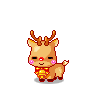It has to do with japanese and the translation. In japanese, you almost never use words like "you" "he" "she". So people just adress another person with their name. The translation just let it stay like that instead of changing the third person speaking style to "you".
I hope, this explanation helped!(⌒▽⌒)
You're right, omae, kimi, anata and so on does mean "you", but is almost never used in normal japanese conversations. In the two years I have lived in Japan, I've often heard it in anime etc, but rarely in real conversation. Ironically, kids tend to use kimi and omae more often, for adult, it's depicted as kind of rude to use it (depending on situation). But I do understand it's kind of weird when you're not used to it haha


why he refers to him in third person? Like????? I was kinda confused at the beginning since he said his name in 3rd person and I was thinking he was talking about some other guy LOLOL it's kinda annoying(⌒▽⌒)"